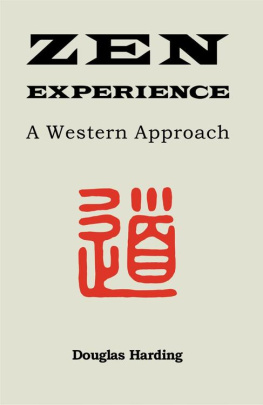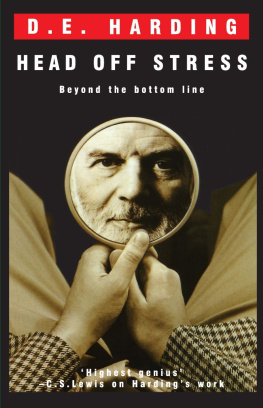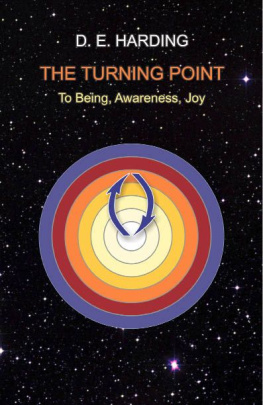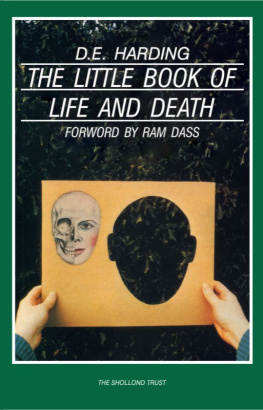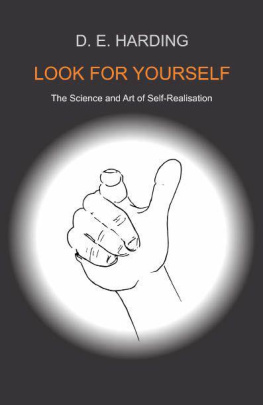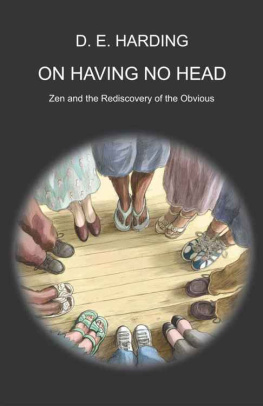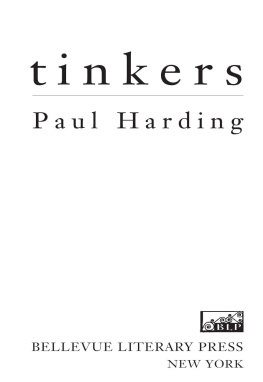Douglas Harding - Zen Experience: A Western Approach
Here you can read online Douglas Harding - Zen Experience: A Western Approach full text of the book (entire story) in english for free. Download pdf and epub, get meaning, cover and reviews about this ebook. year: 2023, publisher: The Shollond Trust, genre: Religion. Description of the work, (preface) as well as reviews are available. Best literature library LitArk.com created for fans of good reading and offers a wide selection of genres:
Romance novel
Science fiction
Adventure
Detective
Science
History
Home and family
Prose
Art
Politics
Computer
Non-fiction
Religion
Business
Children
Humor
Choose a favorite category and find really read worthwhile books. Enjoy immersion in the world of imagination, feel the emotions of the characters or learn something new for yourself, make an fascinating discovery.
- Book:Zen Experience: A Western Approach
- Author:
- Publisher:The Shollond Trust
- Genre:
- Year:2023
- Rating:3 / 5
- Favourites:Add to favourites
- Your mark:
- 60
- 1
- 2
- 3
- 4
- 5
Zen Experience: A Western Approach: summary, description and annotation
We offer to read an annotation, description, summary or preface (depends on what the author of the book "Zen Experience: A Western Approach" wrote himself). If you haven't found the necessary information about the book — write in the comments, we will try to find it.
Zen Experience: A Western Approach — read online for free the complete book (whole text) full work
Below is the text of the book, divided by pages. System saving the place of the last page read, allows you to conveniently read the book "Zen Experience: A Western Approach" online for free, without having to search again every time where you left off. Put a bookmark, and you can go to the page where you finished reading at any time.
Font size:
Interval:
Bookmark:

Zen Experience
Zen Experience
A Western Approach
DOUGLAS HARDING
The Shollond Trust
London
The original cover of On Having No Head
Published by The Shollond Trust
87B Cazenove Road, London N16 6BB, England
www.headless.org
headexchange@gn.apc.org
The Shollond Trust is a UK charitable trust, reg. no. 1059551
Copyright The Shollond Trust 2023
All rights reserved. No portion of this book may be reproduced in any form or by any means without written permission of the publisher.
Cover design: rangsgraphics.com
(Original cover design concept: Douglas Harding)
Interior design: Richard Lang

Preface
On Having No Head by Douglas Harding was published by the London Buddhist Society in 1961. It was subtitled a contribution to Zen in the West . In the Publishers Foreword the reader was informed that: This booklet contains a brief account of a remarkable Zen experience. Now that there is much talk of Zen for the West, it is important as the record of an experience in the mind of a man who at the time had no knowledge of Zen Buddhism. Only in his search for an explanation did he stumble into this field, and find what he needed. These chapters will in due course form part of a larger book called Zen Experience, a Western view , or some such title, but in our opinion they should be made available to all interested with the least possible delay. That larger book was never published. However, after Harding died (2007) I found amongst his papers the chapters that form this booklet. Though Harding intended them to follow on from the first three chapters of the original On Having No Head, they make sense without necessarily being attached to that work. We are happy to make them now available.
Harding understood Zen. He understood Zen because he enjoyed, firsthand, the central experience of Zenthe direct seeing of Who we really are. He knew Zen from the inside. Harding was also inspired by Zen. What I then found in Zen was the fruit and crown of all my past spiritual lifeconfirmation, tremendous encouragement, and many new perspectives opening out. It was a real home-coming. The absorbing and joyful work of self-discoveryculminating in seeing What I actually waswhich had dominated all my adult life, was suddenly given fresh point and put in a much wider frame. From then on, a new openness and satisfaction supervened.
A relationship flows both ways. Though Harding gained from his meeting with Zen, Zen gained from its encounter with Harding, for Harding then presented the essential experience of Zen in a way that made it accessible to Westerners, or indeed to anyone. He demystified Zen. I accompanied Harding to America in 1974. In New York he gave a talk to a Buddhist group. A man in the audience asked Harding about the meaning of a particular Zen question or koan . The koan was: How do you swallow the west river in one gulp? Without missing a beat Harding replied that, though there wasnt a west river nearby, the East River was just up the road. If the man were to stand by it looking upstream then he would see the river flowing into himinto his limitless single eye or mouth. Harding avoided what could have been an inconclusive discussion by inviting the man to experience, for himself, swallowing the river. And it wouldnt even give him indigestion!
Reading these chapters you will discover plenty about Zen. Harding knew his subject. But the main subject of the book is not Zen. It is you. Who you really are. In another version of his Introduction (not the one published here) Harding wrote: true Zen cares nothing about Zen, but only about direct seeing into our own nature. What makes for that end, here and now, is Zen, even if it never met that word; what does not, is not our Zen, even if every Tang master said it. As Harding used to say: Before seeing Who you are, you read the scriptures to see if you have got it right. After seeing Who you are, you read the scriptures to see if they have got it right!
In the early 1970s Harding developed his experiments awareness exercises which guide our attention to our True Nature. Hardings experiments, his skilful means, are important because they actually transmit the Light. They make available the experience of our True Nature. One of the experiments involves you pointing at where others see your face and observing what you see there. Or rather, what you see here . Original! Unconventional! Straight to the point! A special transmission outside the Scriptures. I think Hui-neng, the Sixth Patriarch, (who was adamant that people should SEE their Original Face rather than just think about it) would have appreciated Hardings skill, his ability to show people where their True Nature iswhere it is physically so that they can enjoy it whenever they wish.
Richard Lang
CONTENTS
If thou desirest peace of mind and true unity of purpose, thou must put all things behind thee, and look upon thyself.
Thomas AKempis
We naturally believe ourselves far more capable of reaching the centre of things than of embracing the circumference... And yet we need no less capaciy for attaining the Nothing than the All.
Pascal
A sage is concerned with what is inside him. He abandons the That and lays hold of the This.
Lao-Tzu
Behold, the Kingdom of God is within you.
St. Luke
Introduction
This is not another book about Japanese and Chinese Zen. Already there are excellent accounts of the subject by Christmas Humphreys, Alan Watts, and other writers whounlike meare qualified to describe objectively the background, history, methods, schools, and cultural ramifications of Zen Buddhism in the Far East, and its coming West. Above all, there are the dozen or so works, as spiritually penetrating as they are comprehensive and scholarly, of Dr. D.T. Suzuki, most of them published in this country by Rider and Co. My own debt to these books is very great; and I assume that my readers, too, are familiar with at least some of them.
My own purpose is rather a different one: namely, to approach Zen from the West, in a thoroughly Western give-and-take manner. This programme calls for some explanation.
If we ignore its merely fashionable and beat varieties, there are, basically, two kinds of Western Zen, and both of them are no doubt necessary to its future here. The first gets as near to Eastern Zen as possible. Its ideal aim is mastery of the Chinese and Japanese languages, several years of zazen or sitting meditation in a Kyoto temple under a qualified Roshi, the experience there of satori duly confirmed by him, and return to this country to build up here a branch of the Japanese tradition, transmitting in due course the true Dharma to a succession of Western masters. According to this schoolit bears some obvious resemblances to Roman Catholicismthere can be no really Western Zen, home-grown and drawing its nurture from our own cultural roots. A clean break must be made. For Zen (it is said), in all its subtlety and hidden depths, is quite foreign to us: therefore it can be understood only on its own terms, according to its own strict rules, on the spoteven then they may elude the seeker.
The other kind of Western Zen agrees that the task is exceedingly difficult, and that, even if all our energies are engaged for a lifetime, success is not guaranteed. And it accepts with gratitude and enthusiasm the work of all those devoted scholars, such as John Blofeld, Chang Chen-chi, Charles Luc, Sohaku Ogata, Nyogen Senzaki, and of course Daisetz Suzuki, who have in the past thirty years made the masters teaching available in our own language. It finds this teaching indescribably refreshing and inspiring, because it brings out so clearly and promises to develop so fruitfully tendencies which are already alive here, though neglected. Its firm conviction is that Zen can be deeply understood by Westerners, and really lived here, only in a Western way, honestly and unashamedly, and it is no good our trying to turn ourselves into orientals. Even if we could deny and live down our entire past, our uniquely valuable heritage (and, thank God, we cant), we should only be denying Zen as well. For the spirit of Zen is profoundly sane and natural. It abhors the contrived and the remote, and is always pointing to the ordinary, the given, the here and the now. Our despised present circumstances, just as they are at this moment and with all their seeming obstacles to Enlightenment, are in fact precisely what is needed for that purpose, and all postponement to a more convenient date, all displacement to a more propitious spot, is nothing but escape from that Absolute Perfection which is nowhere but hereif only we could nerve ourselves to see it, and to trust what we saw.
Font size:
Interval:
Bookmark:
Similar books «Zen Experience: A Western Approach»
Look at similar books to Zen Experience: A Western Approach. We have selected literature similar in name and meaning in the hope of providing readers with more options to find new, interesting, not yet read works.
Discussion, reviews of the book Zen Experience: A Western Approach and just readers' own opinions. Leave your comments, write what you think about the work, its meaning or the main characters. Specify what exactly you liked and what you didn't like, and why you think so.

